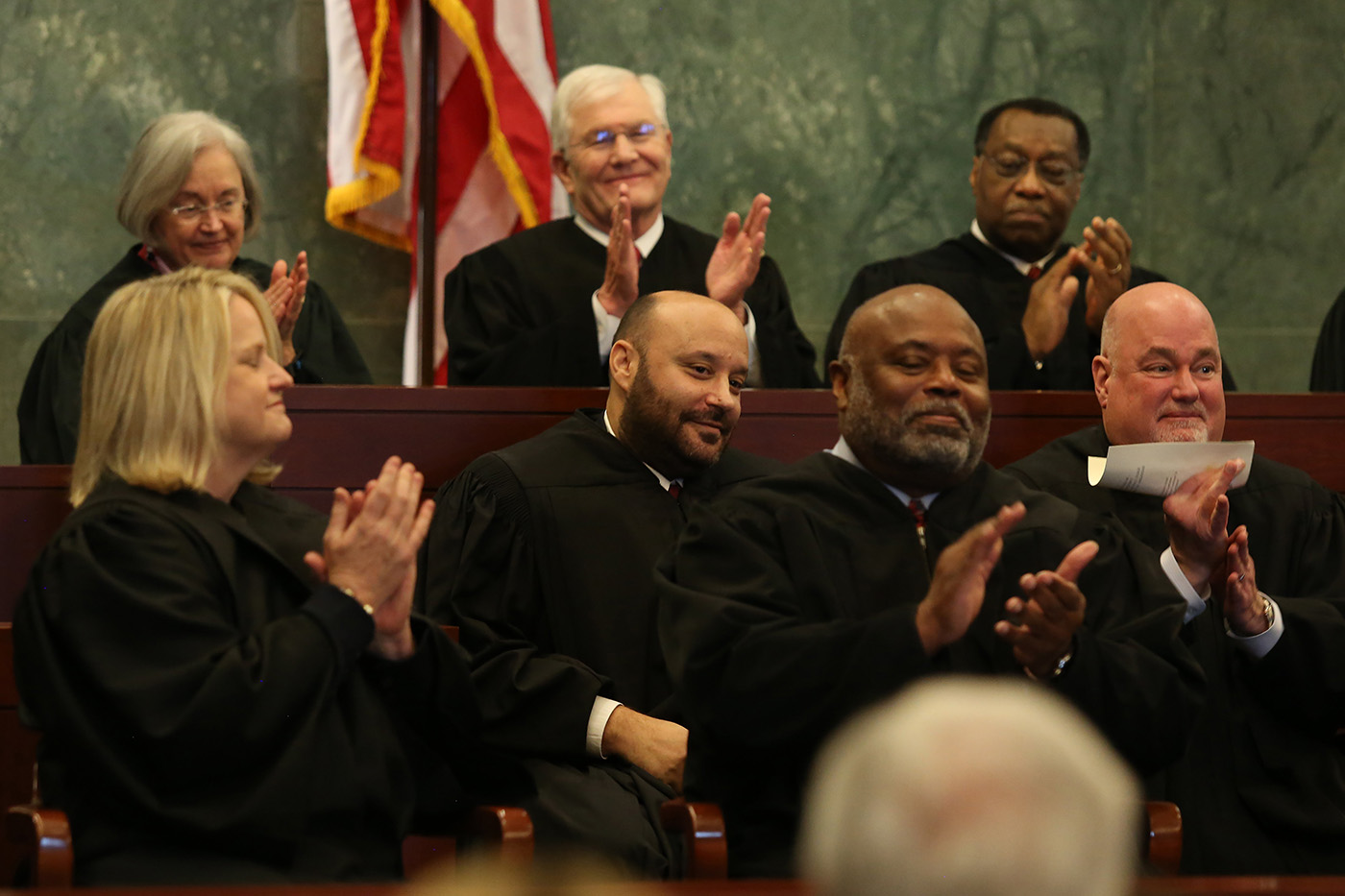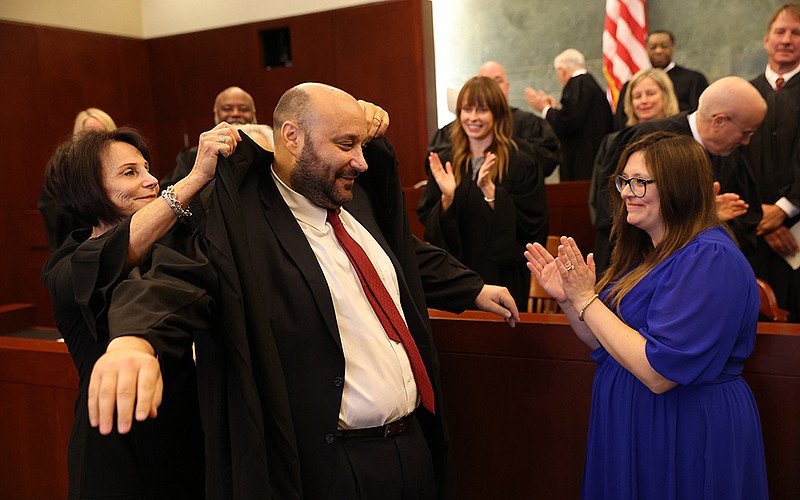After a long delay from the global pandemic, a formal investiture ceremony celebrating the elevation of the newest federal judge to the bench in the Eastern District of Arkansas was held Friday at the Richard Sheppard Arnold Federal Courthouse in Little Rock.
The ceremony, solemnizing the appointment of U.S. District Judge Lee Rudofsky to the federal bench nearly three years ago by then-President Donald Trump, had been scheduled twice, postponed twice, and nearly didn't happen at all, as Rudofsky himself questioned the appropriateness of holding the ceremony after such a long delay. But in his speech during the ceremony, Rudofsky said a chance conversation with a friend convinced him the investiture was more about those who had supported him during his path to the federal bench than exclusively to honor him.
"All of you," he said, "deserve honor and recognition."
As the courtroom began filling, Rudofsky could be seen helping seat people as he shook hands and greeted those coming in, at one point bending down to scoop up his 3-year-old son, Teddy, who was crawling among the feet of those coming in as he played hide-and-seek with his 6-year-old twin sisters, Charlotte and Vivian. Later, after the Pledge of Allegiance, Teddy earned a round of applause when he burst out with a solo pledge -- word for word -- before Chief U.S. District Judge D. Price Marshall Jr. could begin introducing the speakers, who included Sen. John Boozman, Gov. Asa Hutchinson and Sarah Isgur, a longtime friend and former Justice Department official who is now a political analyst for ABC.
Marshall introduced a large panel of judges that included the district judges and magistrate judges from the Eastern District of Arkansas and 8th Circuit Court of Appeals Chief U.S. Circuit Judge Lavenski Smith, a Hope native, and Senior U.S. Circuit Judge Morris Arnold, a Texarkana native -- "This is the L.A. part of the 8th Circuit," Marshall quipped, "lower Arkansas."
Marshall also introduced other judges in attendance from around the country and the state, totaling 33 active and retired jurists in all.
"It is perhaps the most extraordinary gathering of legal talent here at this courthouse since Richard Arnold presided alone," Marshall said, evoking the memory of the late judge for whom the Little Rock federal courthouse is named while paraphrasing President John F. Kennedy's introduction of Nobel Prize winners at the White House in 1962.
Isgur regaled the courtroom with stories from her 18-year friendship with Rudofsky and his wife, Soraya -- whom Rudofsky met when the two were students at Harvard Law School -- her anecdotes provoking such laughter that the proceedings at times resembled a good-natured roast and offered a glimpse into the personality of a judge noted for asking probing questions of lawyers during hearings and often working late hours in his office.
She quipped that one of the more notable things about Rudofsky was how little he had changed since law school.
"I don't mean Lee looks like he's in his 20s, I mean he's always looked and acted like he's in his 40s," Isgur said, prompting loud laughter. "Even the house Lee and Soraya lived in that year looked particularly middle-agey. It had crown molding."
Rudofsky thanked his wife for standing beside him as he took jobs from New York to Alaska to Arkansas.
"You were up for any damned fool thing I wanted to do," he said. "I want you to know how much I appreciate ... all you have done for me, for our children, all that you are."
He called his mother, Roselyn, "the living personification of tenacity and persistence," saying that she had pushed him forward by her example, "or by guilt."
"Our people do that well," Rudofsky, who is Jewish, deadpanned.
He thanked his father, Edward, an attorney, for instilling in him, "a deep love for this country and a passion for the law," as well as, "the importance of error-free writing, something I'm pretty sure my clerks do not thank him for."
In an interview Thursday with the Arkansas Democrat-Gazette, Rudofsky, a Long Island, N.Y., native, offered some insight into how his views were formed and his approach to the job. As a teenager, he said, he and his father and an uncle, both attorneys, would engage in free-wheeling debates about legal questions of the day.
"We talked about the law, about policy, about politics," he said. "In some sense we were a full-spectrum family."
Rudofsky described his maternal uncle, Ben Fine, now deceased, as "an unabashed liberal in his policy views and his approach to the law," who led student protests against the Vietnam War at Columbia University in the 1960s.
His father, he said, "was probably left of center, although not as far as my uncle," who, he said, took his son's opinions and ideas seriously and engaged him in serious debate from a young age.
Rudofsky described himself as having views "that tended right of the center line," but said as a policy matter his views are "strewn all over the political spectrum."
One of Rudofsky's more contentious decisions from the bench involved his ruling that only the U.S. attorney general can bring a lawsuit under Section 2 of the Voting Rights Act, an opinion that has drawn fire from many quarters all over the country. He said because the matter is still in litigation with an appeal to the 8th Circuit and could wind up back on his desk, he could not comment on it, but he said criticism is part of the job.
"There are cases where, no matter how you rule, someone is going to be unhappy," Rudofsky said. "The First Amendment is very important. People can and should be able to criticize judges."
But, he said, big, controversial cases make up only a very small part of a judge's caseload. He said it's the more mundane matters of law that make up the bulk of a judge's work and that cumulatively have a huge impact on daily life.
"Probably 75% of cases involve at least one hard issue," he said. "Those cases don't deserve any less just because they aren't high profile."
Rudofsky said because the Constitution bestows such power on the federal judiciary -- with lifetime appointments providing little accountability to the people -- judicial humility is a must. Abuse of that power, he said, could overrun the legislative and executive branches of government.
"We should only overrule the elected branches of government only when the Constitution clearly requires it," he said, regardless of how a given judge might feel about a particular matter.
"We are not, and we should not be, philosopher kings."
 U.S. District Judge Lee Rudofsky takes his seat on the bench Friday at the Richard Sheppard Arnold Federal Courthouse in Little Rock. Rudofsky initially hesitated at holding an investiture ceremony after three years as a federal judge, but he decided his supporters deserved to be honored. (Arkansas Democrat-Gazette/Colin Murphey)
U.S. District Judge Lee Rudofsky takes his seat on the bench Friday at the Richard Sheppard Arnold Federal Courthouse in Little Rock. Rudofsky initially hesitated at holding an investiture ceremony after three years as a federal judge, but he decided his supporters deserved to be honored. (Arkansas Democrat-Gazette/Colin Murphey)